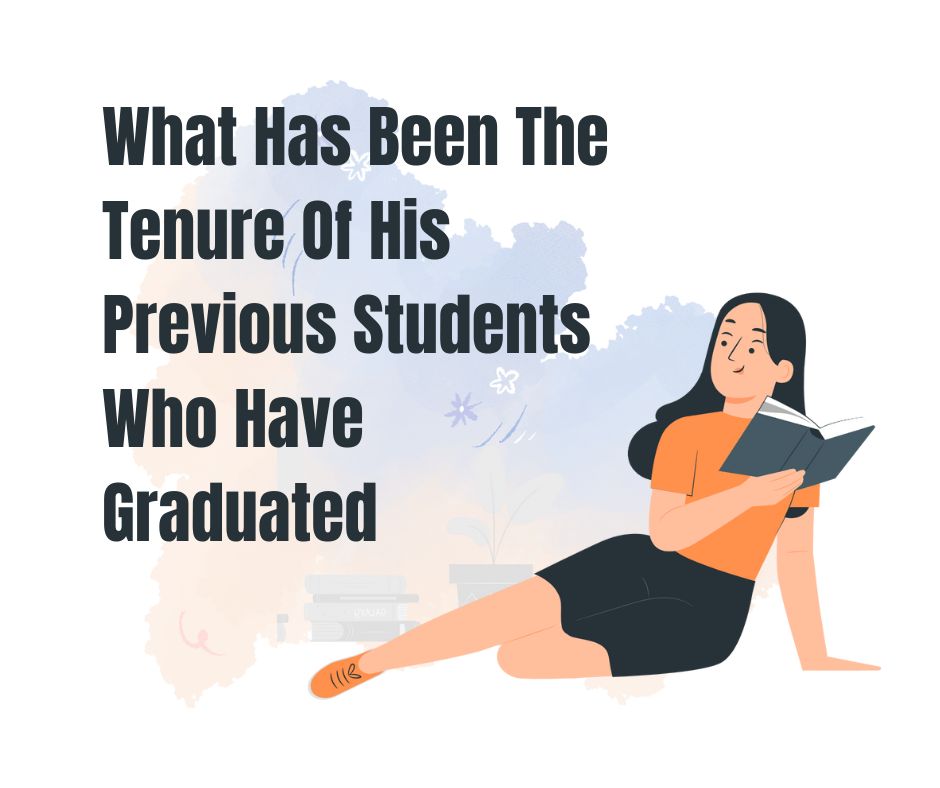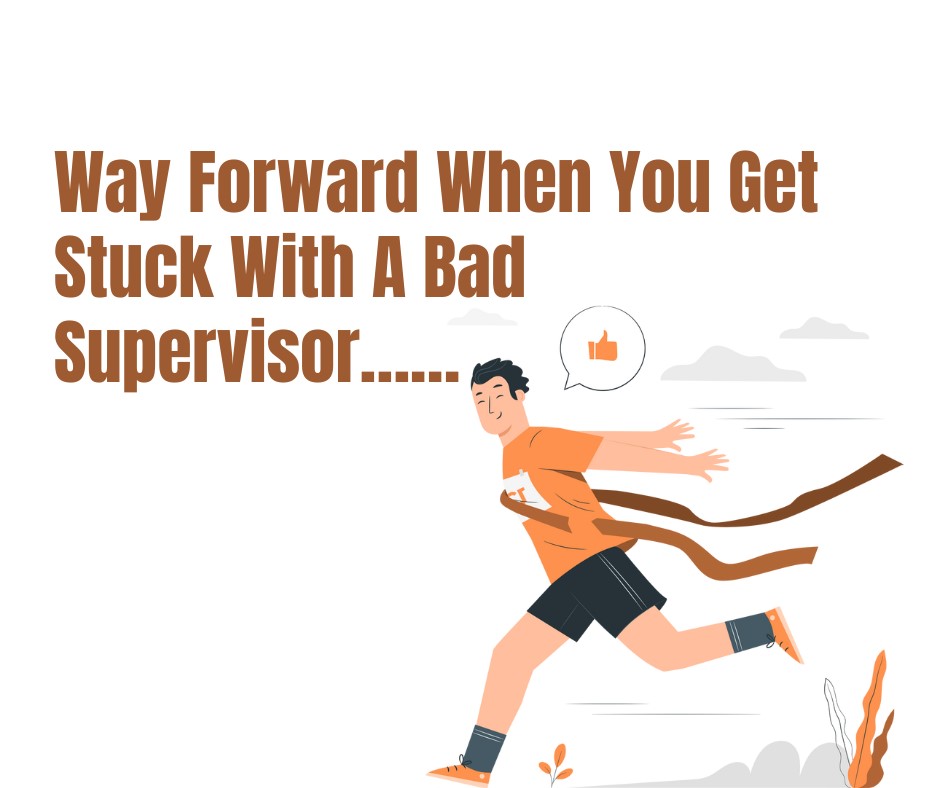The most influential person in your academic life is your PhD supervisor. He plays a diverse and critical role in your PhD journey, that of a mentor, confidant and advisor throughout your PhD degree. Some warning signs you must never ignore when it comes to choosing a good advisor can help you from not making a blunder in getting on to your PhD journey.
His publication record isn’t remarkable:
Publications not only talk a lot about the command on research of the professor, they also help the professor in various ways such as in getting grants, earn tenure and also build their career. If you feel that your potential supervisor is not rich in his publications, this could be a red flag and you should be alert that this could significantly impact your publications during PhD.
The other scholars under him are not able to publish:
The PhD supervisor should be helping his students to publish. If the scholars do not have sufficient publications then it talks a lot about the supervisor and his ability to guide his students to do worthy research. If the senior scholars are not able to publish then there is strong chance that you will not be able to publish easily, either.
He discourages you to connect with his other scholars:
Its always helpful to talk to your supervisor’s other scholars. It helps you to carve your way forward and many times share common issues and concerns and find suitable solutions. If your potential supervisor discourages you to talk to his other scholars or is strict that you cannot interact with them , you must have your alarm bells ringing that there must be issues with his capabilities or his working style because of which he wants to avoid the interaction. In such a case think twice before getting him as your mentor.
What has been the tenure of his previous students who have graduated:

How long has it taken for the previous scholars to graduate and also for that matter, how many of them have graduated so far. If you feel that the supervisor you have under consideration, all his earlier scholars have taken a very long time to graduate or not many scholars have passed out from under him, it’s not suggestive to go ahead with him because its again a red flag on his potential to guide you in a regular manner to spearhead your research.
He is not approachable:
If the supervisor under consideration doesn’t respond to mails or avoids taking your calls, it might be difficult to work under him. Communication is an important element of supervisor and student relationship and the work cannot move forward at a your desired speed if the supervisor is non responsive. This is something you cannot gauge before you enrol yourself under him but in the first few months you
can judge the accessibility to him and consider switching your supervisor if this alerts you in the formative months itself.
There is a negative feedback about him in the academic fraternity:
Before you zero down on the supervisor, it’s important to take his feedback from other students in the campus or professors who have worked or interacted with him. If you get unanimous negative feedback about him from different sources it might conclude that you would also face difficulty to work under him. Issues could be pertaining to potential in research, communication, attitude or even integrity towards work.
You don’t connect with him in the preliminary interview :
Vibes play a very important role and with your supervisor , in the first interview itself you would get an idea about their personality and whether you would be able to connect with him. You must recognise and trust your instincts because your instincts would give you a good idea about him. If in the preliminary interaction, he seems disinterested in your ideas or gets angry or agitated towards you then you would surely find it difficult to adjust with such a person. Always keep in mind that it takes a couple of years to complete your
PhD and not having a pleasing personality in your supervisor can make the journey even more herculean.
They do not want to clarify the monetary funding specifics:

The funding that comes with the course, you must be explicit and sure about it right from the beginning. There is no better person than your supervisor who can do it for you. You need to have a clear idea about your stipend, how much research funds would be allocated to you and whether any other special fund eligibility criteria you are able to qualify. Even if your personality matches well with your supervisor, ultimately if the monetary part
remains unmet or there is misunderstanding on those grounds then it won’t feasible for you to concentrate on your research.
They extend extraordinary praise to you:
Some undeserving PhD supervisors have the habit to extend undeserving praise to their mentees in order to hide their own shortcomings. This is also one of the forms of mistreatment and sometimes its referred to as praise bombing. This might happen more in the beginning stage in order to lure you to join their research group and later once you are a part their behaviour and attitude may both flip over. Such incompetent PhD supervisors, may at a later
stage, when you fail in experiments or faulter in research, belittle you and humiliate you. Other extreme behaviours are signs of in competencies in the supervisor only. You can get a fair idea about such behaviour be interacting with senior students and their experience. Another way to judge the situation is to see the difference in their attitude towards you and other existing scholars, particularly if they are extremely sweet to you and you find them exhibiting a more harsh tone to towards the senior scholars.
They don’t give you the autonomy to work:
Research is not all about your own data collection and thesis writing. It is much more than that. You would want to get the exposure of going to conferences and networking with other researchers to better your prospects. A good supervisor is the one who encourages you and gives you the autonomy to carve your own path and find means to grow professionally and build better future prospects. The ones who intend to exploit you will stop you from attending conferences or meeting others unless every time you seek their permission.
They might feel that you will show more power against them once you get the exposure.
They side track you:
The journey of PhD is extremely daunting and suffocating in its own way. Scholars sometimes feel as victims of the situation. In such a situation sometimes insensitive and harsh supervisors may push students into isolation on the pretext of better productivity. They may curtail your interaction with other faculty and would want complete control over you. In such a situation all the effort of the scholar will go in keeping the supervisor happy rather than his own growth. Its most of the
times not possible to raise your voice also against a supervisor who exploits because it may result in backlashing or gaslighting.
He doesn’t show empathy towards your personal issues:
No one has a life without challenges and problems and personal ups and downs go hand in hand with professional journey. You would want a supervisor who is empathetic in nature but the red flag is when he tells you to keep personal stories at bay and gives no scope of accommodation here. Their only concern is your academic output and they don’t bother with the journey of your parallel life and its impact on your research work.
He scares you that PhD is going to a daunting journey:
Mentors have the prime responsibility to encourage and make the scholars trust their ability to cross through the journey of PhD. Everyone is aware that it’s not an easy journey but if your supervisor constantly makes you feel thar the experience is going to be a nightmare and very scary , he is losing track of his prime responsibility and his contribution in your journey is more negative than positive
He loads you with his own personal work:
More often than not PhD supervisors are looking for scholars who can run their personal errands or do odd jobs for them as it’s a part of their duty. They might even ask you to prepare their lectures and sometimes even baby sit their kids or do their groceries. It’s awkward but once you get into the trap there is more and more work getting on your shoulders. This attitude which is exploitative in nature and shows the self-centred approach of the supervisor is one of
the prominent red flags and you must change your mentor and switch to someone with more honest intentions towards your growth.
Way forward when you get stuck with a bad supervisor……

After being aware of all these issues and being very cautious in choosing your supervisor, if somewhere in the journey of your PhD you have complaints against your mentor, universities should have a mechanism in place to register complaints and find a solution in such a way that the course of the scholar is not impacted in any way.
A scholar places a lot of trust in the supervisor as well as the university when he enrols for a course that will take years to complete and a lot of money from his end. It’s the responsibility of the supervisor as well as the university to support, guide and provide feedback to the scholars and handle issues and concerns they have throughout the tenure.
If you do have an issue with your supervisor that you realise at a later stage of your PhD and you don’t know where to look for a solution, you must speak up for
support and resolving the matter at the grievance handling cell of the university. Remember to be assertive about your concerns. Making a formal complaint is surely going to impact your relationship with your supervisor and you must know this in advance.
Putting in a complaint against your supervisor must be the last resort to resolve the issues and only after you have failed at all other attempts to sort out the matter and you know that despite all efforts your relationship with the supervisor is broken down and there is no way now that you can complete your research work under his guidance.
Another important thing to remember is to keep records and of all your negative experiences with your supervisor with proofs if possible. The committee that sits to resolve your complaints would want all of that in order to validate the issues you have raised against your supervisor.
If possible, always gather testimonials from other scholars to ensure the committee that the problem doesn’t lie in a single student but it comes from the end of the supervisor. This of course may be the end of your journey with a bad guide and be prepared for some adjustments and realignment with a new allocated supervisor if it’s so decided by the grievance redressal committee.
You must check and verify the records of the new supervisor and be doubly sure of not getting into a difficult trap one more time as that would make the situation nearly impossible to resolve. Being calm, proactive and focused in your approach will work here. Don’t hold any personal grudges against the supervisor but rather focus on the issues more because ultimately the academic community is small and composite.
You may have instances in your professional journey where you may still have to come face to face with him in unavoidable circumstances. So, the relationship if it ends at all, should be on a graceful note with courtesies in place and room for mutual dignity and respect so that in all future interactions pleasantries can be exchanged, if not more.

